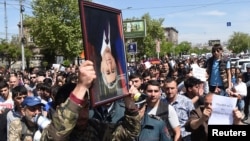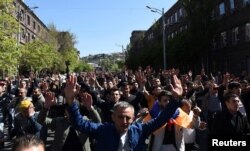Tens of thousands of Armenian opposition supporters rallied Saturday for a ninth consecutive day to demand the resignation of Prime Minister Serzh Sarksyan, but he said the country needed his experience to tackle problems such as Nagorno-Karabakh.
Sarksyan was appointed prime minister this month after serving 10 years as president. The protesters accuse him of clinging to power and demand that he step down.
“In this region with a complex geopolitics and at a time of new challenges we must ensure the stable development of the country and continue efforts aimed at a suitable settlement of the Karabakh problem,” Sarksyan said in an open letter cited by the government’s press office.
“I believe these problems can be resolved. After that, other figures can take the helm,” he said.
Nagorno-Karabakh
Nagorno-Karabakh, a mountainous part of Azerbaijan, is run by ethnic Armenians who declared independence during a conflict that broke out as the Soviet Union crumbled in 1991.
Though a ceasefire was agreed in 1994, Azerbaijan and Armenia still regularly accuse each other of carrying out attacks in the area. The conflict flared up again in 2016 and saw a number of deadly incidents over the past year.
The leader of the protests in Yerevan, opposition lawmaker Nikol Pashinyan, said Sarksyan had agreed to talks with the opposition at a hotel in the capital Sunday morning.
Sarksyan’s spokesman was not immediately available to confirm the meeting.
‘Say no to Serzh’
As on previous days, the protesters marched through Yerevan on Saturday waving national flags and chanting: “Make a stand, say no to Serzh.”
They blocked several streets in the center and staged sit-ins. Police detained about 200 activists.
Armenia’s new president, Armen Sarkissian, an ally of Sarksyan, on Saturday met with Pashinyan, the protest leader, and urged dialogue. Sarkissian was sworn in as president last week after being elected by parliament in March.
On Tuesday, the parliament voted to allow Sarksyan, who served as president of the small ex-Soviet republic from 2008 until this month, to become premier.
Under a revised constitution approved by a referendum in 2015, the prime minister now has the most power in Armenia, while the presidency has become largely ceremonial.
Armenia seceded from the Soviet Union in 1991 but remains dependent on Russia for aid and investment. Many Armenians accuse the government of corruption and mishandling an economy that has struggled to overcome the legacy of central planning.






